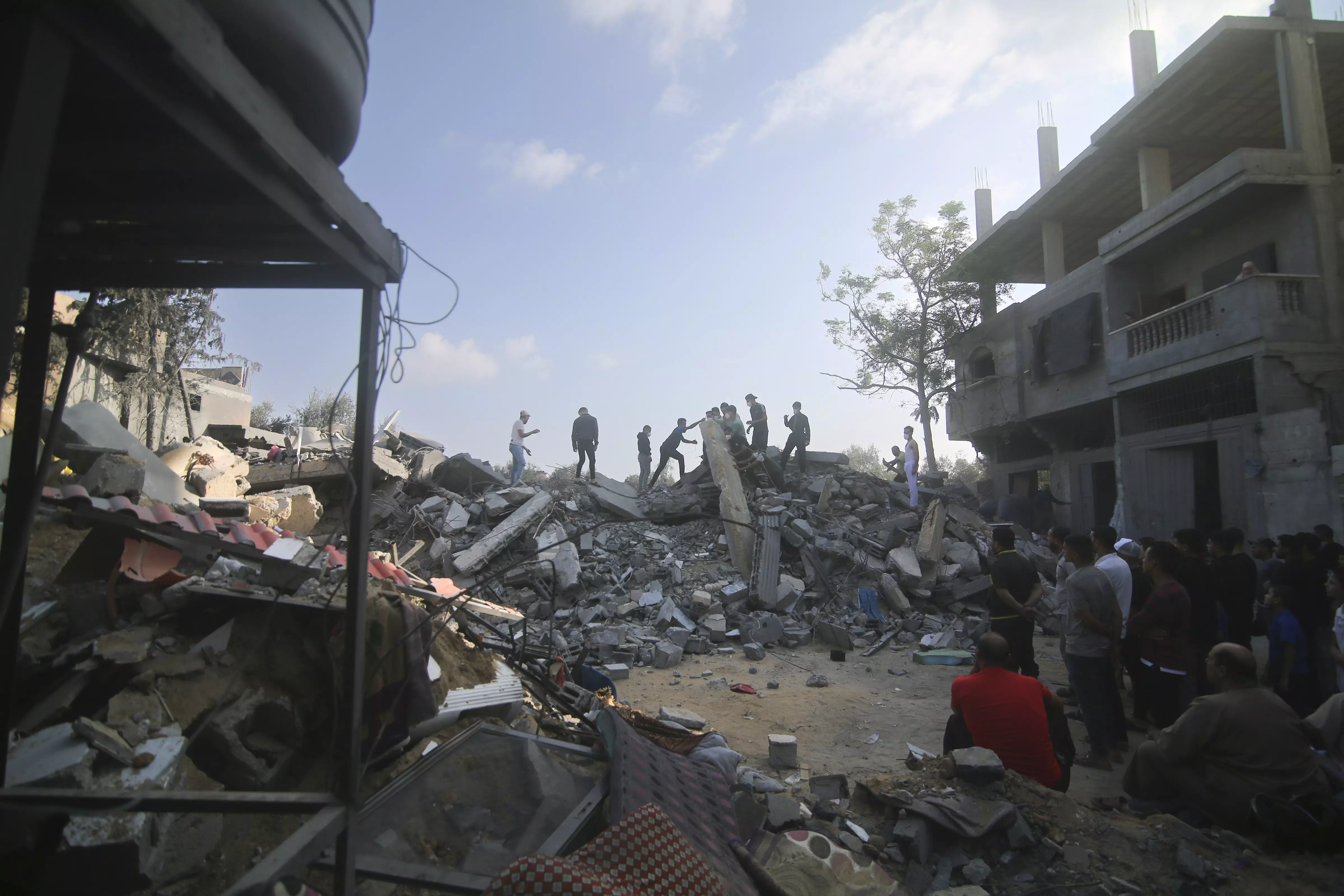
- Home
- India
- World
- Premium
- THE FEDERAL SPECIAL
- Analysis
- States
- Perspective
- Videos
- Sports
- Education
- Entertainment
- Elections
- Features
- Health
- Business
- Series
- In memoriam: Sheikh Mujibur Rahman
- Bishnoi's Men
- NEET TANGLE
- Economy Series
- Earth Day
- Kashmir’s Frozen Turbulence
- India@75
- The legend of Ramjanmabhoomi
- Liberalisation@30
- How to tame a dragon
- Celebrating biodiversity
- Farm Matters
- 50 days of solitude
- Bringing Migrants Home
- Budget 2020
- Jharkhand Votes
- The Federal Investigates
- The Federal Impact
- Vanishing Sand
- Gandhi @ 150
- Andhra Today
- Field report
- Operation Gulmarg
- Pandemic @1 Mn in India
- The Federal Year-End
- The Zero Year
- Science
- Brand studio
- Newsletter
- Elections 2024
- Events
- Home
- IndiaIndia
- World
- Analysis
- StatesStates
- PerspectivePerspective
- VideosVideos
- Sports
- Education
- Entertainment
- ElectionsElections
- Features
- Health
- BusinessBusiness
- Premium
- Loading...
Premium - Events

The LTTE claimed to fight for Tamils but never consulted them; similarly Hamas says it represents Palestinian aspirations but it did not seek their approval for the October 7 massacre of Israelis
Millions who have always stood for a free and full-fledged homeland for Palestinians feel terribly let down by the savagery displayed by an arrogant Hamas on October 7. That the Israeli state has over the decades often dealt with Palestinian civilians brutally is of course true. But aberrations notwithstanding, Yasser Arafat gave a certain moral high to the Palestinian struggle even as he carried a gun in his holster, pitted as he was against the might of the Israeli state. Hamas has shattered that record.
Killing babies is not war
Firing rockets, even in thousands, at Israel or taking on Israeli military personnel in combat or capturing them is one thing; intruding into Israel and butchering Israeli civilians – entire families including children and babies – and spiriting away civilian men, women, elderly and young girls and, far worse, desecrating dead Israelis is completely unacceptable. The videos of the Hamas butchery of civilians is numbing. This is no Israeli propaganda.
Imagine, if the Pakistani terrorists who went on a killing spree of Indians and foreigners in Mumbai had escaped back to Pakistan by sea after capturing several innocent civilians, how would have Indians felt. Furious and bloody angry. This is the mood in Israel now.
Netanyahu’s delusion is broken
In a way, it is far worse. On October 7, Hamas humiliated Israel with a meticulously planned and executed military offensive that took Tel Aviv, which prides itself for having the finest intelligence service, completely by surprise. By the time the government of Benjamin Netanyahu, a divisive figure at the best of times, woke up, Hamas had killed more Jews than at any time since the Holocaust.
The best part of the story is that Netanyahu’s Israel had come to believe that it had somehow tamed Hamas in Gaza, if not the more powerful Hezbollah in Lebanon. It allowed thousands of Palestinians from impoverished Gaza to work in Israel, the numbers steadily rising over the years, in the now mistaken hope that this will defang Hamas. The Israeli state’s longstanding distaste for everything the Palestine Liberation Organisation (PLO) and its founder leader Yasser Arafat stood for extended to the now pale shadow of the original Fatah which administers West Bank – the other Palestinian conclave bordering Israel. Netanyahu and his team thought it would be better to deal with Hamas than with Fatah even though the latter had renounced violence. Israel learnt too late that leopards never change their spots.
India and PLO
I have been an advocate of the PLO and a Palestinian state since the mid-1970s – the earliest when I began to understand the goings on in the world. I was clear that Israel needed to give space to a Palestinian state too. Those where the times when the Arab world largely backed the PLO and were mostly pitted against Israel. The 1973 war and the later developments in the Middle East changed the situation, dividing the Arabs among the moderate Gulf states and the more radical Algeria, Yemen, Syria, Iraq and Libya. The first country to formally shake hands with Israel was Egypt. Jordan had already made its peace quietly. Iraq’s invasion of Kuwait and Arafat’s hugging of Saddam Hussain brought about a permanent schism between the PLO and the oil-rich Gulf sheikhdoms.
My soft corner for the PLO remained even after I became a journalist in 1978. I frequently met and interviewed PLO’s ambassadors in India. In 1984, I covered the Amman meeting of the Palestine National Council, the PLO’s parliament-in-exile. I also visited Palestinian refugee camps in Jordan where I met young Palestinians who said they had studied in Delhi and Pune on scholarship and held India in high esteem. PLO officials would reveal the diplomatic help Arafat silently provided to Indira Gandhi – for whom he had special regards – in the Gulf countries whenever Pakistan went on the offensive over Kashmir. I met Arafat during his frequent visits to New Delhi. India’s bonhomie with the PLO began to ebb after it established diplomatic ties with Israel in 1992. Arafat too eventually stopped coming to India.
Hamas' bloodlust
While Arafat’s PLO was always an Arab outfit, Hamas has always been Islamic. No doubt Arafat was a Muslim but he was secular at heart, and this was one reason (although not the only one) he eventually came to realise that Palestinians can live with Israel. Hamas on the contrary stands for Israel’s destruction – sharing an ideological bond with Iran.
It is this ideology that makes Hamas look at every Jew as an enemy though there are any number of Israelis who oppose a purely military approach to the Palestinian question. This is precisely why Hamas fighters had no compunction in exterminating innocent Israelis, that too in the most cold-blooded manner. October 7 proved there is nothing to differentiate between Hamas and the Israeli military-religious state which will be happy to see all the Palestinians drown in the sea.
In doing what it did, Hamas may have majorly miscalculated. In my view, October 7 will turn out to be for Hamas what 2006 became for the Liberation Tigers of Tamil Eelam (LTTE) in Sri Lanka. Let me explain.
Hamas may meet LTTE’s fate
Like Hamas, the LTTE also steadily grew over the years, ballooning finally to a stage when it controlled one third of all Sri Lankan land territory and two third of the island’s winding coast. In that sense, the LTTE was a far more powerful entity than Hamas. Like the Hamas, the LTTE too had a strong army and a nascent air wing and, unlike the Hamas, a deadly naval wing. Again, unlike the Hamas, which has never been able to kill any top Israeli leader, the LTTE assassinated a president of Sri Lanka, a former prime minister of India, a foreign minister and a defence minister of Sri Lanka and numerous VIPs in the island nation. The LTTE achieved all this without the active support of any country while the Hamas is backed both militarily and financially by Iran and some less important state actors.
The long saga of successes made the LTTE complacent and overconfident. It came to believe that it could never be defeated and that every time it reignited a war it would emerge more powerful. Yet, when he launched Eelam War IV in 2006, LTTE chief Velupillai Prabhakaran would have never imagined that he and his famed outfit would be history in just three years.
Prabhakaran thought that by forcing tens of thousands of Tamils to mass around him in the last stages of the war, Sri Lanka would not unleash a barrage of missiles and rockets. Colombo proved him wrong. By asking the people of Gaza not to flee despite Israeli warnings, the Hamas is taking a similar line. At the same time, while it was wrong to kill a mass of innocent Tamils in the name of crushing the LTTE, it would be terribly wrong to punish every Palestinian in Gaza for what the Hamas did. The LTTE claimed to fight for Tamils but never consulted them; Hamas says it represents Palestinian aspirations but it did not seek their approval for October 7.
While no two situations are absolutely comparable, I am clear that the Hamas is now encountering a situation similar to what the LTTE faced shortly before its end. Will the Hamas meet a similar fate? Time will answer that question.


